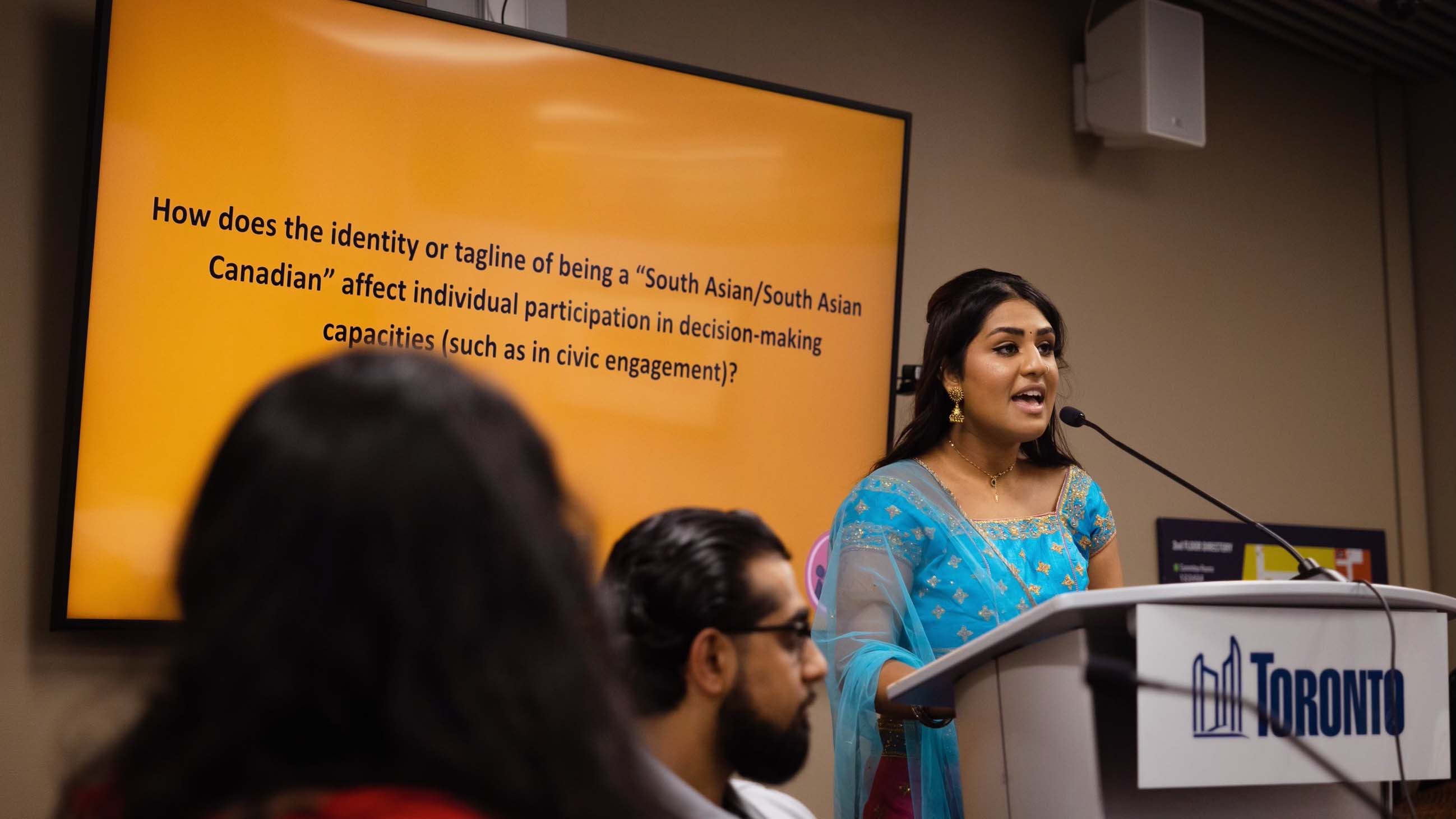Elevating youth voices everywhere
Shaped by personal experience, Ashwini Selvakumaran asks hard questions that push for greater equity.
By Leslie Knowles

Ashwini Selvakumaran, MES’24, has always understood the power of perspective, particularly those whose voices are not heard. That understanding, shaped by her lived experience, education, and years of community work, now propels her onto the world’s stage.
This past summer, Ashwini represented Canada at the Youth 20 (Y20) Summit in South Africa, serving as the Equity, Diversity, and Inclusion Coordinator. There, she worked with youth delegates from G20 nations to influence global policy on climate action, social justice, and economic equity issues, all areas she’s been advocating for long before she stepped onto an international platform.
“I’ve always been interested in systems, but more importantly, how to change them,” Selvakumaran said. “Representation is not just about being present in a space, it’s about having the power to shape it.”
A lived experience
Ashwini moved to Canada 10 years ago. Prior to Canada, she lived in Yemen, New York, Malaysia, and Kazakhstan. Each one of these places played a part in shaping who she is today. Living in these countries opened her eyes to poverty, inequality, and rigid structures in other parts of the world.
“When you're a young child, you're mostly concerned about having fun. But a lot of my friends were living in such different disparities than I was. That really opened my eyes at a young age to the stark inequalities that exist and really built my interest in making sure there's equity for all.”
That early awareness sparked a passion for community engagement. As a teenager and young adult, she took on roles that centered youth voice and social justice. She later co-founded Brown Citizen Circle, an organization that explores South Asian identity through the lens of anti-oppression. The organization hosts storytelling sessions, art showcases and roundtable discussions that make room for complex, often underrepresented narratives.
“We ask the hard questions about caste, colourism, and migration,” Ashwini said. “It’s not always comfortable, but it’s necessary.”
Her efforts also reached government levels. She worked at the Ontario Ministry of Energy, contributing to the province’s efforts in sustainable and inclusive policy development and she served on several youth advisory bodies, helping bridge the gap between young people and public institutions.

Merging personal values with professional vision
Despite her extensive work outside of the academic world, Ashwini credits her time at Western’s Master of Environment and Sustainability (MES) program as deeply formative. It was here that she found the opportunity to merge personal values with professional vision.
“Western challenged me intellectually and gave me the tools to think critically about environmental systems, especially through the lens of justice,” she says.
The program’s emphasis on Indigenous perspectives, equity training, and cultural sensitivity training helped her sharpen her focus. She explored how damage to the environment affects poor and racialized communities more than others. This was something Ashwini had noticed before but could now study with support from school.
“I saw climate change, not just as an ecological issue, but a social one,” she said. “Who has access to clean air, water, and green space? These are equity issues.”
Ashwini also found community among her classmates and professors, many of whom shared her passion for inclusive sustainability. “There’s something powerful about being in a room where your values are mirrored but also challenged in ways that help you grow.”
Amplifying youth voices across the globe
At the Y20 Summit, Ashwini is helping shape an agenda that reflects the diverse realities of youth around the world. In her role, she led the development of the EDI strategy and outreach plan, helping to engage more than 10,000 young people across Canada in the lead-up to the summit. “Young people have the ideas, the energy and the urgency. “But they’re often not at the table where decisions are made. That’s what we’re trying to change.”
Her approach is grounded in lived experience, but it’s also deeply strategic. She believes effective policy begins with listening, particularly to voices that are too often left out.
“Nothing about us without us. That’s what drives me.”
Embracing the next chapter
Although the summit is a major milestone, Ashwini views it as part of a much longer journey, one that began long before she entered a classroom or stepped into a policy room. “I’ve been doing this work since I was 14, even before I had the language to name it,” she said. “I just knew things weren’t fair, and I wanted to help fix them.”
Her advice to students and young changemakers is both practical and powerful. “Don’t wait for permission to care,” she said. “If you see a gap, fill it. If a door doesn’t open, build your own. And always root your work in community.”
With her combination of academic rigor, community-focused experience and a clear sense of purpose, Ashwini is bringing her whole self to the global stage. This is something she hopes inspires others to do the same.
“I’m not just showing up for me,” she says. “I’m showing up for every young person who’s ever been told they don’t belong.”
Recently, Ashwini focused on preparing Sodashi: Weaving the Tapestry of South Asian Culture, a cultural bazaar and fashion event that celebrates South Asian art, entrepreneurship, and community. She aimed to spark a deeper connection and inspire others to join in the celebration.

